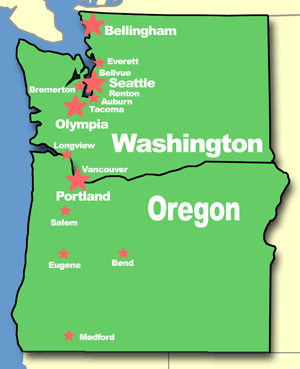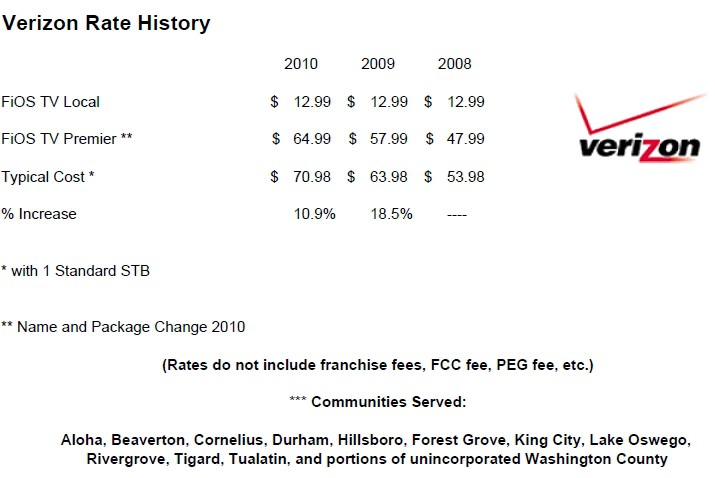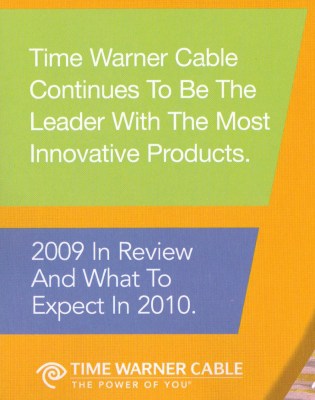Former Verizon FiOS customers now served by Frontier Communications in Oregon and Washington are receiving word of astonishing rate increases of as much as 46 percent from the phone company. The massive rate increase is being blamed on “increasing programming costs” charged by the cable networks carried on a cable system that competes with Comcast, which charges far less for the same channels.
Frontier’s rate hikes are so dramatic — $30 a month for the popular standard 200-channel package, some customers are wondering whether the company is trying to sabotage their own fiber-to-the-home service.
“They sent us a rate increase letter stating our former standard package, priced at $65 a month, is now going up to a ridiculous $95 a month for basic cable,” says Tom, a regular Stop the Cap! reader. “That’s a rate increase only my health insurance company could love.”
New customers face the new rates immediately, but existing customers have until Feb. 18 before the new high price kicks in. Many are preparing to move back to Comcast, which raised rates this year as well — but is now a relative bargain at $63 a month for a similar package.
“As much as I love FiOS, Frontier has managed to screw it up as badly as the rest of their services and now I am going back to Comcast,” Tom says. “You have to wonder if they are purposely incompetent or if it’s part of a larger plan to sabotage the Verizon FiOS network they inherited. Either way, they’ve priced their service out of the market.”
When Tom called Frontier to complain, the company offered to rip out the advanced fiber network Verizon installed and stick a DirecTV satellite dish on his roof instead.
 “Frontier is a real ‘Back to the Future’ kind of company — they just don’t get it,” Tom said. “The operator actually told me she couldn’t understand why I would want to cancel service.”
“Frontier is a real ‘Back to the Future’ kind of company — they just don’t get it,” Tom said. “The operator actually told me she couldn’t understand why I would want to cancel service.”
Customers receiving new customer promotional discounts will get a real case of sticker shock when Verizon’s original promotional rates reset to Frontier’s new regular price.
“Washington County better beef up their hospitals because there are going to be a lot of heart attacks when that bill arrives,” Tom says.
The Oregonian newspaper reports customers are not the only ones to be shocked by Frontier’s enormous rate increase. Regulators promised more competition and cheaper prices as part of Frontier’s purchase of Verizon landlines feel had as well.
“[Frontier’s rate hike] is essentially a white flag surrender and an exit from the head-to-head video competition,” lamented David Olson, director of the Mt. Hood Cable Regulatory Commission.
That’s a far cry from what Frontier Communications CEO Maggie Wilderotter told the newspaper in September when asked if the company would raise FiOS rates.
“That is not our plan. If I look across the board at our basic service pricing, I don’t think we’ve raised prices anywhere in the last four or five years,” she said.
The Oregonian quotes a Frontier representative who says the company’s relatively small customer base disqualifies them from volume discounts Verizon used to receive.
“Part of the challenge we have, compared to other providers, is that our footprint is so small,” said Frontier spokeswoman Stephanie Beasly. “They’re able to spread it out over a much larger customer footprint.”
That can’t be the whole story, said Fred Christ, policy and regulatory affairs manager for the Metropolitan Area Communications Commission, which regulates cable TV in Washington County.
“There’s more to it than programming costs. Anybody in the industry can pretty much figure that out. What more there is, we don’t know yet,” he said. “Unless programmers are trying to run Frontier out of business, why would they jack their rates that much?”
Smaller companies like Frontier generally do not try and buy programming on their own, but join group-purchasing plans like those offered by the National Cable Television Cooperative. Municipal providers routinely purchase programming at substantial discounts. It is not known if Frontier is a member, but they could be.
- Basic local service package, with local broadcast stations: Rises from $12.99 to $24.99
- FiOS TV Prime HD (220 channels, including the most popular sports and entertainment networks): Rises from $64.99 to $94.99
- FiOS TV Extreme HD: Rises from $74.99 to $104.99
- FiOS TV Ultimate HD: Rises from $89.99 to $119.99.
No rate increases are planned for broadband or telephone service.


 Subscribe
Subscribe







